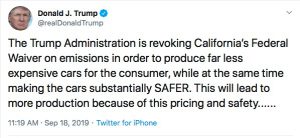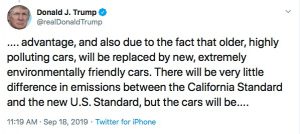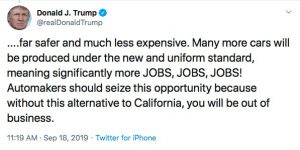
President Donald Trump tweeted that he will revoke California’s authority to set its own emissions standards.
President Donald Trump issued a clear signal that his administration will move forward with plans to both rollback federal fuel economy standards and strip California of the right to set its own emissions standards, something that was first approved by Congress nearly a half-century ago to help the state address its critical air pollution problems.
The president effectively confirmed what’s in store with a Wednesday tweet declaring “The Trump Administration is revoking California’s Federal Waiver on emissions in order to produce far less expensive cars for the consumer, while at the same time making the cars substantially SAFER.”
Formal announcements covering both federal mileage standards and the California waiver are expected to come on Thursday morning in Washington when U.S. EPA Administrator Andrew Wheeler and U.S. Department of Transportation Secretary Elaine Chao deliver what is being billed as a “major policy announcement.”
(Trump Admin. Set to Revoke California’s Authority to Set Vehicle Emission Standards)
The announcement drew quick blowback from a variety of quarters, even from some of the automakers who could potentially benefit from the lower mileage targets and the need to no longer develop vehicles that can meet tougher California emissions mandates.
 “Today’s vehicles are safer, more reliable, and perform better than ever before, all while reducing harmful emissions and saving money on gas, thanks in large part to standards that the EPA is now trying to undo,” said Shannon Baker-Branstetter, Manager of Cars & Energy Policy for Consumer Reports. “This attack on the Clean Air Act only benefits oil companies, whose profits are being put ahead of consumer health and wellbeing.”
“Today’s vehicles are safer, more reliable, and perform better than ever before, all while reducing harmful emissions and saving money on gas, thanks in large part to standards that the EPA is now trying to undo,” said Shannon Baker-Branstetter, Manager of Cars & Energy Policy for Consumer Reports. “This attack on the Clean Air Act only benefits oil companies, whose profits are being put ahead of consumer health and wellbeing.”
While the White House contends that consumers will pay more for cleaner, higher-mileage vehicles, a Consumer Reports analysis determined that the opposite is true, estimating motorists will pay about $3,300 more in fuel costs for every vehicle they own by rolling back the fuel economy standards set under the Obama Administration to the lower levels the current White House team is targeting.
As for safety, officials with the EPA and the National Highway Traffic Safety Administration –which jointly set the Corporate Average Fuel Economy, or CAFE, standard, late last year declared that raising mileage would result in more highway deaths because Americans would travel more. They’ve also claimed that lightweighting vehicles to improve fuel efficiency would make them less able to stand up to a crash. Both arguments have been widely discounted, however.
With the formal announcement of White House plans set to be announced during an 8 AM news conference in Washington, reaction was quick and, in many cases, fierce.
“For us, this is about survival. Our communities are screaming for help to address the climate crisis. Unlike the Trump Administration, we don’t run scared,” adding that, “We’re prepared to lead. We’re prepared to fight. We’ll do what we must.”
(Trump Sharpens Focus on California’s Deal with Automakers; DOJ Launches Probe)
Legal observers have cautioned that the battle over the CAFE and Clean Air rules could drag on past next year’s election.
The Auto Alliance, a lobbying group representing many of the major automotive manufacturers, did not immediately respond to the president’s tweet and the planned CAFE announcement on Thursday. But it laid out the industry’s concerns in a statement shortly after the four automakers announced their deal with CARB, noting in a statement, “Uncertainty from protracted litigation is a major concern for an industry with long production cycles, so much capital investment and 10 million Americans dependent on auto paychecks.”
That position was echoed on Wednesday by Art St. Cyr, the head of automotive operations for American Honda. The Japanese automaker was one of four car companies – the others being Ford, Volkswagen and BMW – that negotiated a deal with the California Air Resources Board, or CARB, in July that would see them only slightly back off from the fuel economy standards set by the Obama Administration.
“We’re not changing our strategy,” St. Cyr told TheDetroitBureau.com on Wednesday, following the debut of the automaker’s first gas-electric SUV, the 2020 CR-V Hybrid.
 Ironically, he said, Honda’s investment in high-mileage technology is working to the advantage of the U.S. Honda has spent $4.2 million to upgrade its Indiana assembly plant, creating 34 new jobs in the process, to produce the CR-V Hybrid, and future products could generate even more jobs and investments.
Ironically, he said, Honda’s investment in high-mileage technology is working to the advantage of the U.S. Honda has spent $4.2 million to upgrade its Indiana assembly plant, creating 34 new jobs in the process, to produce the CR-V Hybrid, and future products could generate even more jobs and investments.
The Justice Department has complicated matters by announcing several weeks ago that it has launched an antitrust investigation into the deal between the four automakers and CARB.
Studies routinely show that Americans support better fuel economy, including more than three-quarters of those owning large SUVs and pickups, Consumers Union found in a survey released last month.
(Trump Chides Automakers for Making Deal With California)
If the administration eventually succeeds in eliminating the California Clean Air waiver it would actually have a much broader impact because 13 other states, as well as the District of Columbia, now follow the stricter mandate. All told, about one in three American car buyers live in those states.
